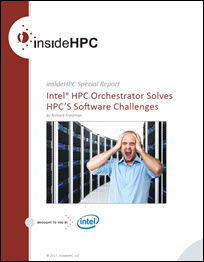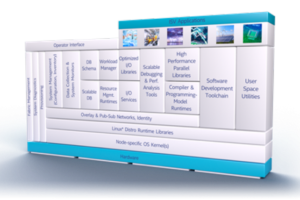This is the first article in a four-part series that explores using Intel HPC Orchestrator to solve HPC software stack management challenges. The complete report, available here, outlines some of these challenges in detail, and explores the benefits of Intel’s product that extends OpenHPC.

Download the full report.
While most of the fundamental HPC system software building blocks are now open source, dealing with the sheer number of components and their inherently complex interdependencies has created a barrier to adoption of HPC for many organizations. Installing and maintaining stable versions of all the components in an ever-deepening HPC software stack has become extremely difficult and time consuming, and a serious pain point for both new and experienced users.
Responding to the challenges common to HPC users, the Linux Foundation launched OpenHPC in late 2015 as an international collaboration of research labs, academia, and hardware/software vendors. Its mission: to normalize and simplify the HPC environment with an integrated collection of HPC-centric open source software components using installation frameworks that deploy seamlessly on top of existing Linux distributions. More information about OpenHPC is available at www.openhpc.community.
Installing and maintaining stable versions of all the components in an ever-deepening HPC software stack has become extremely difficult and time consuming, and a serious pain point for both new and experienced users.
A new insideHPC Special Report explores the challenges of managing open source HPC middleware and unpacks the unique solution offered by Intel HPC Orchestrator—the Intel-supported distribution of the OpenHPC stack that has been tested and validated on the most recent hardware, including Intel Xeon Scalable Processor Family (formerly code named “Skylake”), Intel Xeon Phi processors, and Intel Omni-Path Architecture products. Intel HPC Orchestrator builds on and enhances the OpenHPC framework with features required by most production supercomputing environments. This report also presents stories from HPC system managers about their own experiences with the Intel HPC Orchestrator software stack and its unique benefits.
[clickToTweet tweet=”Intel HPC Orchestrator builds on and enhances the OpenHPC framework. #HPCsoftware” quote=”Intel HPC Orchestrator builds on and enhances the OpenHPC framework. #HPCsoftware”]
Benefits of Intel HPC Orchestrator
Intel HPC Orchestrator solves many of the challenges to HPC adoption:
- Pre-integrated mix of most common open source and commercial middleware for HPC system configuration.
- Pre-validated and tested updates to many individual middleware stack components.
- Pre-tested with the latest Intel architectures, and validated to run up to 2,000-node clusters.
- Additional tools for data-intense and diverse workloads easily added and managed.
- Bonus tools for ensuring best system and application performance on current and new hardware architectures.
- Support from Intel eliminates need for in-house expertise over an ever-expanding number of software components and technologies.

Intel HPC Orchestrator simplifies the design, deployment, and use of HPC clusters, and includes optimized development and runtime support for AI applications.
- Intel HPC Orchestrator adds value to OpenHPC by leveraging the experience of Intel to ensure delivery of a reliable HPC middleware stack validated on the latest Intel architectures. The net result is that fewer administrators are needed to manage larger systems by offloading the responsibilities for tracking component versions and updates to Intel.
- Intel HPC Orchestrator will continue to evolve to include new installation and management tools to enhance the system administrator and end user experience. With Intel HPC Orchestrator, Intel has lowered the barrier to building productive HPC clusters.
You can download the “insideHPC Special Report: Intel HPC Orchestrator Solves HPC’S Software Challenges,” courtesy of Intel.




